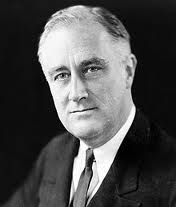 The Roosevelt Institute recently celebrated the anniversary of the birth of President Franklin Roosevelt. In this post on the Institute’s website, Senior Fellow David Woolner reviews some of FDR’s accomplishments for a generation that may be more familiar with Facebook than fireside chats. Most of the essay has to do with the domestic economic institutions created during the New Deal but he also notes those international institutions created to preserve the peace of the post-war order under U.S. leadership:
The Roosevelt Institute recently celebrated the anniversary of the birth of President Franklin Roosevelt. In this post on the Institute’s website, Senior Fellow David Woolner reviews some of FDR’s accomplishments for a generation that may be more familiar with Facebook than fireside chats. Most of the essay has to do with the domestic economic institutions created during the New Deal but he also notes those international institutions created to preserve the peace of the post-war order under U.S. leadership:
Finally, we should remember that prior to World War II the United States had turned inward and refused to play a leading role in world affairs. Convinced that the Second World War had come about in part from the global economic depravity that helped give rise to fascism in Europe and Asia, FDR used the war as a catalyst for the construction of a new political, strategic, and economic order. It was based in large part on the extension of American moral and military power through the United Nations and the extension of American economic power through the creation of the International Monetary Fund, World Bank, and a new multilateral economic system that would open up the world’s markets and natural resources to freer trade. Taken together, these measures resulted in a permanent restructuring of the world’s social, economic, and strategic makeup. They formed the basis of the new world order that has given rise to the globalization of the world’s economy and the American-led multilateral security system that the United States has played a leading role in since 1945.
As much as I would like to believe, with Woolner, that these institutions still form the basis of a stable world order, it’s clear that time has taken a toll on their legitimacy and credibility. Take the United Nations, for example. Just today, the Security Council failed to pass a resolution on Syria hours after an attack on the city of Hom’s by Assad’s security forces, an attack that some are calling a massacre. U.S. Ambassador Susan Rice voiced “disgust” over the veto by permanent members Russia and China that has derailed any hope of coordinated action to end the violence. The U.S. should be proud of having assembled a broad diplomatic consensus with allies in Europe and the Arab League. In the end, though, it was no match for the veto power wielded by permanent members.
The UN was born in the aftermath of a world war started by dictators and now permanent members of the Security Council are defending a dictator. What would FDR think?
Image Credit: Wikipedia